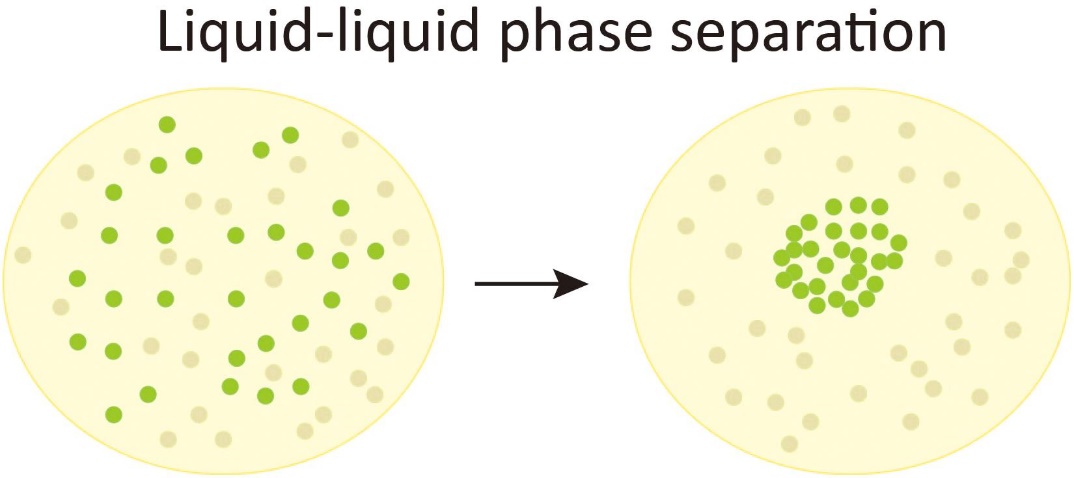A New Method for Promote Intracellular Phase Separation
The cell is the basic unit of the structure and function of the organism. How the various components in the cell gather at the correct time and space to perform their corresponding functions is a problem that cells need to solve in a series of basic life activities. Intracellular compartmental segregation is critical for diverse cellular processes. Researchers have discovered that in addition to classifying contents through the formation of membrane-bound organelles, intracellular components can also be separated from each other by "phase separation" to form aggregates (condensate) so that some components are enclosed. Some components are blocked so as to achieve a variety of biological functions. Liquid-liquid phase separation (LLPS) (shown in Fig.1) may be the physicochemical basis for cells to form membrane-less organelles. It has also been reported to have an essential relationship with some diseases like cancer and neurodegenerative diseases. Phase separation has become a research hotspot in life sciences and has gradually been applied to other fields.
 Fig.1 Liquid-Liquid Phase Separation
Fig.1 Liquid-Liquid Phase Separation
Endogenous IDRs have been shown to perform homotypic or heterotypic phase separation; however, in addition to endogenous IDRs, engineered IDRs can also be used to promote intracellular phase separation. Research has shown that artificially synthesized IDRs can affect intracellular phase separation by changing the polypeptide sequence. Recently, researchers have optimized the transformation of GFP to fuse with short cationic peptides to promote the formation of intracellular aggregates. By adding short peptides of different lengths, the intracellular phase separation can be affected to different degrees, which can avoid the aggregation of the recombinant target protein in the inclusion bodies and quickly recover the protein through the aggregation of phase separation, and retain their biological activity. This technology can effectively promote the formation of aggregates and is a crucial tool essentialgical research, and has excellent potential in the purification of proteins and recombinant enzymes.
The Advantages of this platform include:
- Promotes intracellular phase separation
- Increase production of protein and recombination Enzyme
- No complicated steps
Potential Applications
- Purification of recombinant proteins and Recombination Enzyme
- Research tools for phase separation
- Expression and purification of proteins in cosmetic production
Profacgen is a state-of-the-art protein service provider. We provide custom protein services in the biological sciences, enabling access to the latest tools, techniques, and expertise with competitive pricing and rapid turnaround time. We serve a broad spectrum of industrial and academic clients committed to delivering high-quality data and customer services.
Please do not hesitate to contact us for more details if you are interested in this new method, and we will provide a considerate service for you. At the same time, we also offer other RNA-protein interaction detected services; please move to our website for more details.
Reference
- Yang J, Yang X. Phase Transition of Huntingtin: Factors and Pathological Relevance. Front Genet. 2020 Jul 23;11:754. Doi: 10.3389/fgene.2020.00754.